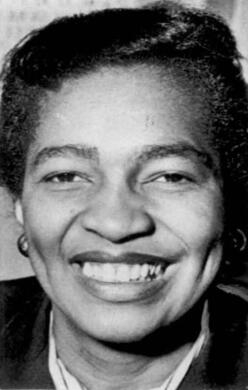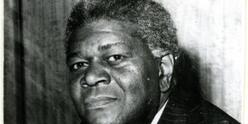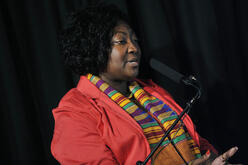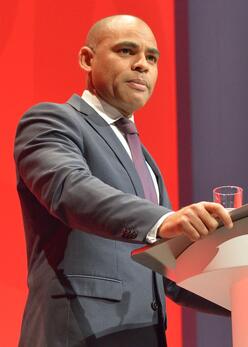For Black History Month, we’re highlighting Black British activists who have been pioneers in advocating for equality here in the UK.
Here are just a few of many Black British activists championing our values and making the world a fairer place for all.
Claudia Jones

Originally from Trinidad, Claudia Jones’ family moved to New York where she worked as a journalist and political activist for 30 years. She joined the Young Communist League of America and was eventually deported from the US for “un-American activities”, coming to the UK as a political refugee in 1955.
Racial tensions were high in London in the 1950s, Claudia lived amongst the newly arrived Caribbean migrants who arrived in the UK upon the Empire Windrush, a passenger ship that brought one of the first large groups of postwar West Indian immigrants to the United Kingdom. In 1958, wanting to give a voice to the growing Caribbean community, Claudia Jones founded the West Indian Gazette. She believed that "people without a voice were as lambs to the slaughter".
Following the 1958 Notting Hill race riots, Claudia created the first Caribbean Carnival, held in St Pancras Town Hall. It was an event providing the Caribbean community with the space to celebrate their culture in London in the belief that: “unity can defeat rising racial tensions”.
The slogan of the event was ‘A people’s art is the genesis of their freedom’. These celebratory events paved the way for one of the UK’s most famous celebrations: Notting Hill Carnival.
Lord David Pitt

Lord David Pitt was the first person of African descent to run for a parliamentary seat in Britain in the 1959 general election. Pitt was defeated in both his attempts to be elected as the first Black MP, however, in 1961 he was elected to the Hackney district in London’s city government which was later incorporated by the Greater London Council In 1964.
Lord Pitt served as deputy chair of the Greater London Council before becoming the first Black chair in 1974, paving the way for the multiracial politics for which the Greater London Council became known.
Lord Pitt was appointed to the House of Lords in 1975 by Prime Minister Harold Wilson. Born in Grenada, he was the second peer of African descent to sit in the House of Lords. Lord Pitt was granted a life peerage and was the longest-serving Black Parliamentarian.
Lord Pitt spoke out against stricter immigration policies and in 1993 Lords debate upon the Asylum and Immigration Appeals Bill, Pitt delivered a passionate defence for refugees to Britain. In his speech, Lord Pitt argued that it was unreasonable to expect refugees to have all the “proper papers” when they are running for their life: “Someone running for his life may have had a passport but there is certainly no question of his going to get a visa.”
On reflection of his work, Lord Pitt said: “Some Black people regard me as an Uncle Tom, while some whites regard me as a Black Power revolutionary. So I imagine I got it about right.”
Phyllis Opoku-Gyimah

Phyllis Opoku-Gyimah (also known as Lady Phyll) is co-founder and director of UK Black Pride, the first event of its kind in Europe celebrating LGBTQ people of African, Asian, Caribbean, Middle Eastern and Latin American descent. Black Pride has increased visibility and advocacy for Queer, Trans and Intersex People of Colour in the UK and beyond, celebrating its 15th anniversary in August 2020.
Lady Phyll is also a trustee of Stonewall, the LGBT rights charity, and sits on the Trades Union Congress race relations committee. In 2019, she was appointed Executive Director at the Kaleidoscope Trust, the leading UK charity advocating for the human rights of LGBTQ people globally.
When we rise together, we are mighty.
In her activism fighting for LGBTQI+ rights for people from marginalised communities, she is vocally inclusive of refugees and asylum seekers, who often face fear of persecution for their sexuality and gender identities.
In 2016, Lady Phyll refused an MBE in the New Year’s Honours List in protest of LGBTQI+ persecution in Commonwealth countries that still have repressive anti-LGBT laws, saying: "I don't believe in empire. I don't believe in, and actively resist, colonialism and its toxic and enduring legacy in the Commonwealth, where - among many other injustices - LGBTQI people are still being persecuted, tortured and even killed because of sodomy laws… that were put in place by British imperialists."
Marvin Rees

Marvin Rees was elected mayor of Bristol in May 2016, making Bristol the first major European city to have elected a mayor of Black African heritage. He has declared Bristol a city of hope, built on ambition, inclusion and social justice.
Marvin was born in Bristol to a mixed-race family. His dad came to the UK from Jamaica as a child, and his mother who was part of a white Welsh family. As the only Black child in his class at primary school, Rees remembers being met with racism as a daily occurrence growing up. Before running for Mayor, Rees’ early career was in Broadcast Journalism at BBC Bristol where he has since spoken about how he believes he experienced racial discrimination. He’s been quoted as saying: “Racism has never been about calling people names. It’s a system of power.”
Marvin recognises the importance of refugee contributions to society here in the UK. In 2018, his work to integrate refugees in the city of Bristol gained an international profile and he became the first mayor to take part in UN discussions on the global compact for migration. Rees was also invited to the first-ever Global Refugee Forum in 2018, where he attended a discussion about how sports can help integrate communities as well as shared learnings from partnership work taking place in his city.
Racism has never been about calling people names. It’s a system of power.
“My aim is to get people relating to each other with dignity; talking to each other, knowing that their children have the same life chances as each other,” Marvin said in an interview with infomigrants. “Then you will have the basis for genuine integration.”